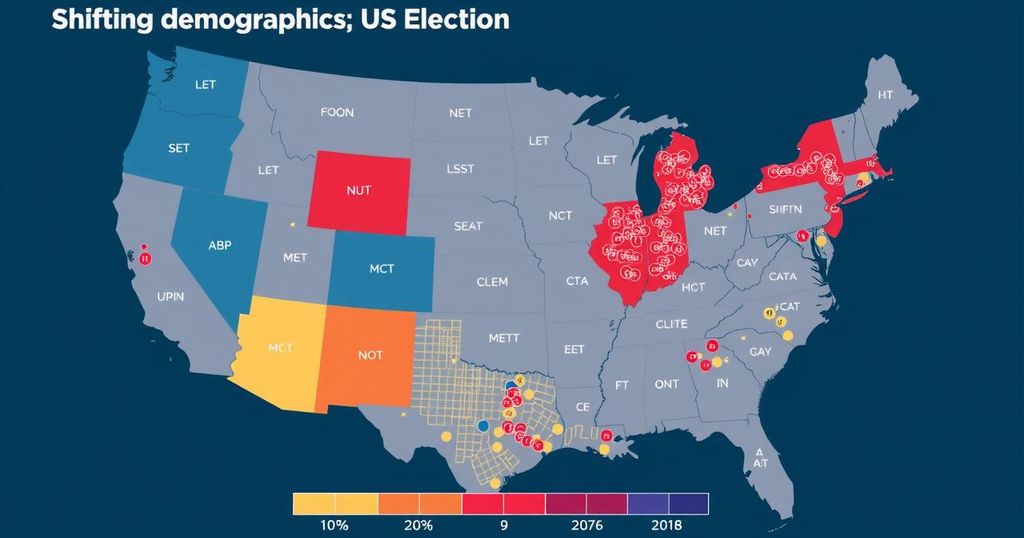Gender Dynamics in the 2024 Presidential Election: A Focus on Male Support for Trump and Declining Female Support
Donald Trump holds an 11-point lead over Kamala Harris among male voters, with a notable appeal to Hispanic and African-American men, despite his past derogatory remarks. Young men, particularly those disillusioned with Joe Biden, increasingly identify with conservative ideologies, contributing to Trump’s support. Conversely, women’s support for Trump has waned due to his controversial statements and the overturning of Roe v. Wade, indicating a significant gender gap in voting patterns for the 2024 election.
A recent New York Times poll indicates that Donald Trump possesses a significant lead over his opponent Kamala Harris among male voters, with an 11 percentage point advantage. Trump’s support predominantly stems from white men, but he has also made inroads with Hispanic-American and African-American male demographics despite his controversial remarks regarding these groups. Approximately half of Hispanic men view Trump as sufficiently assertive for presidential responsibilities. Moreover, troubling patterns persist as a substantial segment of young African-American men – around 25% of those under 50 – expresses support for Trump, signaling a disconnection from his past controversial actions. The appeal of Trump resonates significantly with young men, especially those aged 18-29 who were disillusioned by Joe Biden’s candidacy. Trump’s popularity among this demographic can be partly ascribed to a broader shift of young men toward conservative ideologies. In stark contrast to the progressive leanings of young women, young men increasingly identify with Republican values, reflecting a pronounced political divergence over the past quarter-century. Young American men are often attracted to Trump’s assertive persona, particularly as they feel societal pressure to conform to traditional masculine norms. Many men perceive an imbalance in societal representation, with approximately two-thirds believing their interests should be prioritized more. Scholars posit that some of Trump’s supporters may be grappling with concepts of masculinity, wherein their struggles with societal expectations augment their attraction to a figure who seemingly challenges political correctness. Trump has cultivated a masculine image through bombastic campaign rhetoric, often indulging in provocative and crude commentary. This behavior appeals to certain segments of male voters who may sense an erosive effect of women’s advancement on their own social standing. Alarmingly, a Pew Research study from 2024 reveals that a third of Trump supporters possess the conviction that progress made by women has occurred at men’s expense. Contrarily, Trump’s standing with women has noticeably diminished, particularly in light of misogynistic comments from himself and his running mate J.D. Vance, which resonate poorly among female voters. The Supreme Court’s decision to overturn Roe v. Wade has particularly galvanized women against Trump, with support for reproductive rights factoring heavily into the electoral calculus. While there is minimal disparity between male and female support for reproductive rights, the issue weighs significantly more on women’s voting decisions. Consequently, Trump’s lead among white women has significantly shrunk, evidencing a potential shift in previously solid support bases.
The dynamics of the 2024 U.S. election reveal stark contrasts in voter sentiment based on gender. Polling data indicates a demographic shift, particularly highlighting Trump’s strong appeal among male voters, especially young men, while simultaneously illustrating a drift of women away from his support, particularly in response to his rhetoric and various socio-political actions. The increasing polarization along gender lines illustrates a transformative period within U.S. political landscapes, underscored by nuanced perceptions of masculinity and women’s rights, notably influenced by recent legislative changes regarding reproductive health. Disinformation tactics, the legacy of past controversies, and evolving societal expectations contribute to a more complex electoral battlefield that transcends traditional party lines.
In conclusion, the upcoming election reflects pronounced gender-based divides in support for Donald Trump, with significant backing from men contrasted by a stark decline in support from women. Young men exhibit a marked alignment with Trump’s assertive style, potentially as a response to contemporary pressures regarding masculinity amid broader societal changes. While Trump’s rhetoric may effectively mobilize certain male factions, it simultaneously alienates substantial segments of female voters, particularly on issues of reproductive rights and gender equality. As the election approaches, it remains pertinent to observe how these dynamics will ultimately influence voter turnout and decision-making.
Original Source: theconversation.com




Post Comment